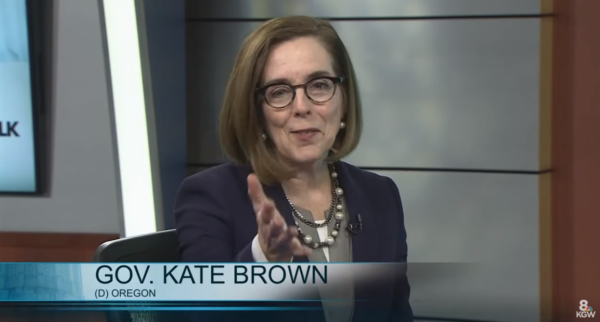
Fox News is reporting on the latest legal activities against primarily Democrat governors and their emergency orders aimed ostensibly at reducing the spread of the coronavirus, raising a question about whether these state chief executives have overstepped their authority.
In Wisconsin, Democrat Gov. Tony Evers was slapped down by that state’s Supreme Court, which nullified his “safer at home” order “on the grounds that his administration did not have the power to unilaterally impose the restrictions without the input of the state legislature.”
In Oregon Monday, a county circuit court judge handed Democrat Gov. Kate Brown a setback by declaring her emergency order extension “null and void” but the decision was blocked hours later by that state’s Supreme Court. The Oregon high court issued a stay, pending full review of the case.
Massachusetts Gov. Charlie Baker, sued in federal court by the Second Amendment Foundation, Firearms Policy Coalition and Commonwealth Second Amendment, Inc., issued a “reopening plan” that includes firearm retailers and gun ranges on a list of businesses that can operate, with certain restrictions.
Michigan Gov. Gretchen Whitmer has been under fire for weeks, leading to demonstrations at the Capitol in Lansing. She is being sued by Republican state lawmakers challenging her extension of an emergency order that locked down the state weeks ago.
The list, as detailed by Fox News, goes on, and the governors involved have almost uniformly argued what they’ve done is necessary to stem the spread of the COVID-19 pandemic. One Republican, Gov. Mike DeWine of Ohio, has also been sued by gym operators, the Fox story said.
“It’s insulting,” argued Illinois Gov. J.B. Pritzker. “It’s dangerous and people’s safety and health have now been put at risk.”
But is something being lost in perspective, or deliberately deflected? The question among grassroots activists fighting back against shutdowns and demanding their states re-open isn’t whether the coronavirus isn’t serious and people are getting sick. The question is whether the governors can actually legally do what they’ve done.
Oregon’s Brown, according to the lower court ruling, extended her order beyond a 30-day limit without involvement of the Legislature.
Governors who ordered gun shops closed, or left them off arbitrary lists of “essential” businesses, have been challenged on Second Amendment grounds. When an official includes a marijuana shop to remain open but closes a gun store, activists have argued this isn’t about keeping people healthy, but about using a crisis to impose their gun control agenda.
Fox News senior judicial analyst, former New Jersey Judge Andrew Napolitano, contends the Garden State’s “stay at home” order is unconstitutional.
“We need more people to resist these unlawful incursions into freedom by the governors,” Napolitano said during an appearance on the “Fox and Friends” morning program.
It doesn’t help clarify the situation when there is disagreement about COVID-19 data. Just enter “COVID-19 deaths overstated” on a favorite search engine and one gets differing opinions with headlines such as “Colorado amends coronavirus death count – says fewer have died of COVID-19 than previously reported,” along with a report at Business Insider that contends, “Comparisons of the number of deaths from the coronavirus and the seasonal flu likely undercount the former and overcount the latter, according to a new report from two doctors.”
Forbes published an analysis of the dispute last week, which may answer lots of questions but raise new ones.
Still, this does not answer the original question; whether state governors have overstepped their authority by shutting down their states, and essentially closing down the economy.
What might be argued is that state governors, more than the federal government and the Trump administration, are far more responsible for the crashed economy and skyrocketing spike in unemployment in March and April.
That’s why the lawsuits challenging emergency orders are important. They could place limits on gubernatorial authority, or at least provide road maps for state lawmakers on where the lines should be drawn.